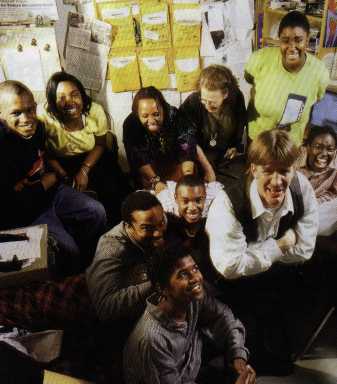


Unsung heroes The 1999 Computerworld Smithsonian Awards -- which honor IT projects that benefit society -- feature high-profile firms like Federal Express, Schwab and Cisco. But they also spotlight far lesser-known names such as Calton, Hitchcock and Mandel By Kathleen Melymuka 06/07/99 When Richard Calton left a 10-year teaching career to work as a computer coordinator at the Harlem public school district in New York, he found he missed the kids. So he got hold of a laptop, a digital camera, a server and a handful of former students - and used his Web skills to bring HarlemLive to life.
HarlemLive (www.harlemlive.org) is a mosaic of life in that African-American community produced by Harlem high school students and delivered as a Web magazine. Calton says it was his kind of project from the start. "There were no committees, no forms, no permissions [needed], no bureaucracy," he recalls. But there was also no money and no place to work. So Calton persuaded the Institute for Learning Technologies (ILT) at Columbia University in New York to host the site on its server and provide some unused office space, phone lines and computers. Last November, the project moved to a community technology center in Harlem called Playing 2 Win.
The staff is all-volunteer, including Calton, who by his own example has induced two dozen adult advisers from the community to join in. "Everyone sees he is volunteering his time, so they say, 'I guess I can do that too,' " says Mara Rose, director of Playing 2 Win. "He's very devoted and true, and that spreads to everyone who gets involved."
At age 3, HarlemLive still has the vibrancy of a new idea. "So many sites have a brief period of creative fervor and then stagnate," says Robbie McClintock, co-director at the ILT. "But HarlemLive keeps changing."
A recent issue included a visit with U.S. Rep. Charles Rangel (D-N.Y.), a look at how three new businesses will affect the community, reporting on a protest over the imprisonment of a former Black Panther accused of murder and reaction to the Littleton, Colo., high school shootings. There also were book, theater and movie reviews; poetry; editorials; and lots of excellent photographs.
"It keeps growing, and we have more and more ideas, but we still haven't received funding, so it's hard to keep it together," says Calton, who pays expenses out of his own pocket. "There are times when it gets frustrating," he concedes. "People say, 'Oh, you're so fundable! You're so fundable!' So give us some money!" A couple of the project's advisers are writing grant proposals, and Calton says he hopes that eventually he can hire some full-time staff, including himself.
The student staff has grown to about 75, half of whom are regulars like Kerly Suffren, a two-year veteran and a junior at Martin Luther King Jr. High School. Suffren, a poet, reporter and spokesman for the project, says HarlemLive makes learning fun. "My communications skills went up dramatically," he says. "I've applied what I learn to my schoolwork, and my grades have gone up."I've also learned to deal with people," Suffren adds. "As a reporter, sometimes you talk to people and you know right away you don't like them, but you have to deal with these things."
He credits Calton with much of what he's learned. "He's a very good teacher," Suffren says. "He's very giving and willing to listen, and he cares about us." "It's an excellent example of a fully authentic education," McClintock says. "They learn because they want to make an excellent site that tells the world what's going on in Harlem. They feel they're doing their own community a significant service. It's a wonderful framework for education."
Observers call Calton the glue that holds the staff together. "He loves working with the kids," Rose says. "He comes right from work and is here till 10, 11 or 12 every night. And the kids know it."Clearly, Calton is teaching more than academics. "The biggest thing is not necessarily the computer skills, though those are a big plus for getting into college and getting better jobs," Calton says. "And it's not just the writing skills, though that's good to have as well. It's the exposure they get. It's going into situations and meeting people - particularly people of color - they would have no way of doing otherwise and communicating and realizing there are opportunities open to them as well."
"He's very inspirational," Suffren says. "Sometimes I question how he does it because he has a real job, then he comes in and deals with us kids. We're fortunate to have him on our side."